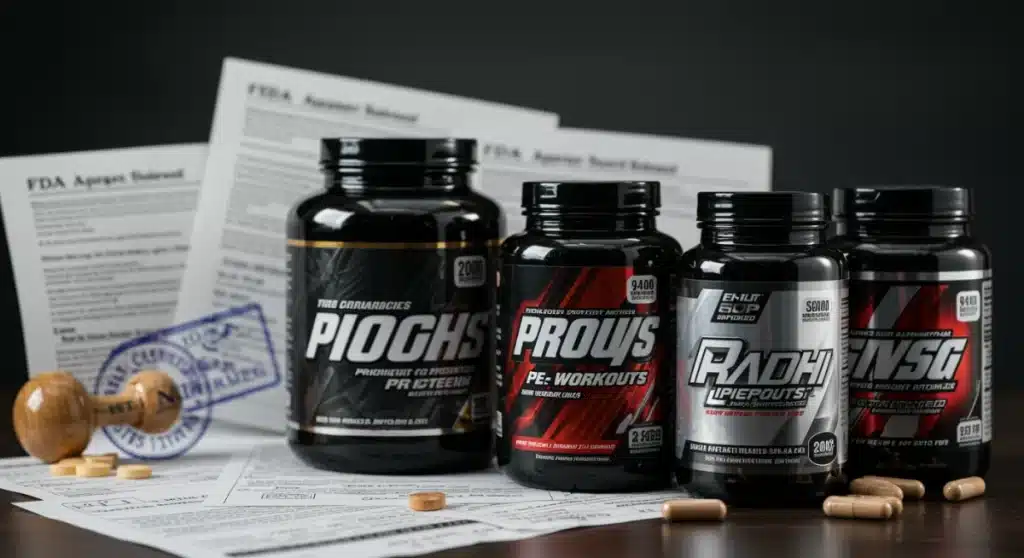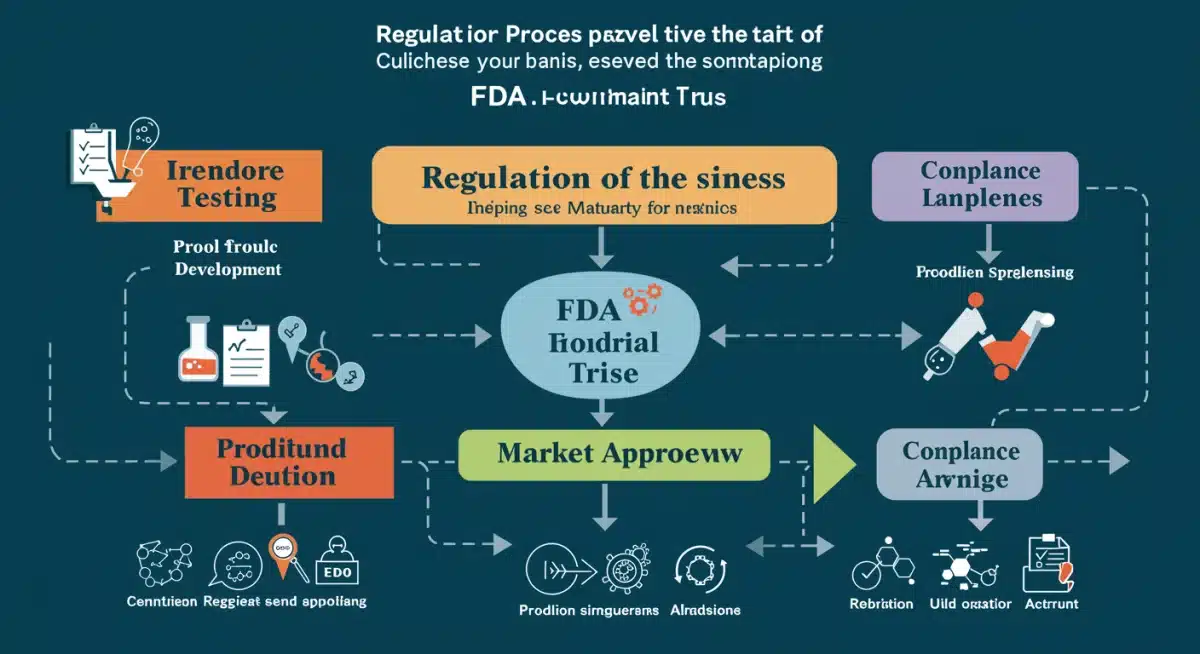FDA Regulations 2025: Impact on Sports Nutrition Supplements

Anúncios
New FDA regulations, effective January 2025, are set to significantly reshape the sports nutrition supplement market, enhancing consumer safety and product transparency across the United States.
Anúncios
A significant change is on the horizon for the sports nutrition industry. Starting January 2025, new FDA sports nutrition regulations will fundamentally alter how supplements are manufactured, labeled, and marketed in the United States. This alert is crucial for athletes, fitness enthusiasts, and manufacturers alike, as understanding these changes is key to navigating the future landscape of performance-enhancing products.
Anúncios
Understanding the New Regulatory Framework
The Food and Drug Administration (FDA) has been working to enhance oversight within the dietary supplement industry for years. These upcoming regulations, set to take effect in January 2025, represent a comprehensive effort to standardize product quality, ensure ingredient safety, and improve transparency for consumers. The goal is to protect public health while fostering a more trustworthy market.
The Driving Force Behind the Changes
The FDA’s decision to implement these new regulations stems from several factors, including a rise in adverse event reports linked to dietary supplements, concerns over misleading labeling, and the proliferation of products containing undisclosed or prohibited ingredients. This proactive stance aims to address these issues head-on, ensuring that what’s on the label is truly what’s in the bottle.
- Increased Consumer Safety: Protecting users from harmful or ineffective products.
- Enhanced Transparency: Requiring clear and accurate ingredient disclosure.
- Fair Market Practices: Leveling the playing field for compliant manufacturers.
These new rules are not merely minor adjustments; they signal a paradigm shift in how sports nutrition supplements are regulated. Manufacturers will face stricter compliance requirements, and consumers will benefit from a more reliable product selection. The implications are far-reaching, affecting everything from product development to retail shelves.
Key Changes for Manufacturers
For sports nutrition supplement manufacturers, January 2025 marks a critical turning point. The new FDA regulations introduce more rigorous standards for Good Manufacturing Practices (GMPs), ingredient sourcing, and product testing. Companies must adapt quickly to avoid compliance issues and market disruption.
Stricter Good Manufacturing Practices (GMPs)
The updated GMPs will demand a higher level of quality control throughout the manufacturing process. This includes stricter protocols for facility hygiene, equipment maintenance, and personnel training. Manufacturers will need to demonstrate robust systems for preventing contamination and ensuring product consistency.
- Facility Audits: More frequent and thorough inspections by regulatory bodies.
- Process Validation: Documented proof that manufacturing processes consistently produce the intended results.
- Supplier Qualification: Enhanced scrutiny of raw material suppliers to ensure ingredient purity and quality.
These elevated standards are designed to minimize risks associated with manufacturing errors and ensure that every batch of supplements meets stringent quality criteria. Companies that fail to update their GMPs could face significant penalties, including product recalls and legal action.
Enhanced Ingredient Verification and Testing
A major focus of the new regulations is on the verification and testing of ingredients. Manufacturers will be required to conduct more comprehensive testing of both raw materials and finished products to confirm ingredient identity, purity, strength, and composition. This aims to eliminate instances of adulteration or mislabeling.
Furthermore, companies must maintain detailed records of all testing procedures and results, making them readily available for FDA review. This increased accountability will help build greater trust in the industry and provide consumers with confidence in the products they purchase.
Impact on Product Labeling and Claims
One of the most visible changes under the new FDA regulations will be seen on product labels. The FDA is cracking down on misleading claims and requiring more precise and accurate information to be displayed. This shift is intended to empower consumers to make more informed decisions about the sports nutrition supplements they choose.
Clearer Allergen and Warning Statements
Labels will need to feature more prominent and explicit allergen declarations, making it easier for individuals with sensitivities to identify potential risks. Additionally, warning statements regarding potential side effects or interactions with medications will be standardized and more clearly presented. This is a crucial step towards preventing adverse reactions and ensuring consumer safety.
Scrutiny of Health and Performance Claims
Manufacturers will face increased scrutiny over the health and performance claims made on their packaging and in their marketing materials. Any claim must be substantiated by scientific evidence, and vague or exaggerated statements will likely be challenged. The FDA aims to curb unsubstantiated promises that can mislead consumers about a product’s true benefits.
This means that marketing departments will need to work closely with scientific and legal teams to ensure all claims are both accurate and defensible. The era of broad, unverified assertions is drawing to a close, paving the way for more honest and evidence-based marketing.
What it Means for Consumers
For consumers of sports nutrition supplements, the new FDA regulations effective January 2025 bring a wave of positive changes. The primary benefit will be an enhanced level of confidence in the safety, quality, and efficacy of the products available on the market. These regulations are designed with the consumer’s well-being at the forefront.

Greater Assurance of Product Quality
Consumers can expect higher quality products due to the stricter manufacturing practices and ingredient testing requirements. The risk of purchasing contaminated, mislabeled, or adulterated supplements will significantly decrease. This means peace of mind for those relying on these products to support their fitness goals.
Improved Transparency and Informed Choices
With clearer labeling and more accurate claims, consumers will have access to better information. This transparency enables them to make truly informed decisions about which supplements are right for them, based on reliable data rather than marketing hype. Understanding exactly what ingredients are present and in what quantities becomes much simpler.
- Read Labels Carefully: Pay attention to updated allergen warnings and ingredient lists.
- Verify Claims: Look for products with scientifically backed performance claims.
- Choose Reputable Brands: Opt for manufacturers known for their commitment to compliance and quality.
Ultimately, these regulations foster a more responsible industry, where consumer health and trust are prioritized. This new era of regulation empowers individuals to pursue their athletic and wellness goals with greater safety and confidence.
Challenges and Opportunities for the Industry
While the new FDA regulations aim to improve the sports nutrition landscape, they also present both significant challenges and unique opportunities for businesses operating within the sector. Adapting to these changes will require strategic planning and investment from manufacturers and retailers.
Compliance Costs and Market Consolidation
Meeting the new GMPs, testing requirements, and labeling standards will inevitably incur additional costs for manufacturers. Smaller companies, in particular, may struggle to absorb these expenses, potentially leading to market consolidation as some may be acquired or forced out of business. This could reshape the competitive landscape significantly.
However, for companies willing to invest in compliance, this also presents an opportunity to differentiate themselves. Brands that can proudly demonstrate their adherence to the highest standards of quality and safety will likely gain a competitive edge and build stronger consumer loyalty.
Innovation and Trust as Competitive Advantages
The regulations could spur innovation as companies seek new ways to meet standards while maintaining product effectiveness. Furthermore, brands that proactively embrace transparency and quality will build greater trust with consumers, which is an invaluable asset in a competitive market. This shift towards credibility can be a powerful marketing tool.
- Invest in R&D: Develop new products that meet stringent regulatory requirements from the outset.
- Build Consumer Trust: Highlight commitment to safety and quality in all communications.
- Educate Stakeholders: Inform retailers and consumers about the benefits of compliant products.
The challenges are real, but the opportunities for growth and enhanced brand reputation for those who adapt effectively are equally significant. The industry is poised for a transformation that, while demanding, promises a more robust and trustworthy future.
Preparing for January 2025: A Call to Action
With January 2025 rapidly approaching, both manufacturers and consumers must take proactive steps to prepare for the implementation of the new FDA sports nutrition regulations. Readiness will minimize disruption and ensure a smooth transition into the updated regulatory environment.
For Manufacturers: Immediate Steps
Manufacturers should immediately begin a comprehensive review of their current operations, from raw material sourcing to final product distribution. This includes evaluating existing GMPs against the new standards, assessing testing protocols, and redesigning labels and marketing materials to ensure full compliance. Engaging with regulatory experts and industry associations can provide invaluable guidance during this period.
- Conduct a Gap Analysis: Identify areas of non-compliance in current processes.
- Allocate Resources: Budget for necessary upgrades in equipment, training, and testing.
- Update Documentation: Ensure all records are meticulously maintained and easily accessible.
Proactive preparation is not just about avoiding penalties; it’s about securing a brand’s future in a more regulated and consumer-focused market. Early adopters of the new standards will likely be seen as industry leaders.
For Consumers: Staying Informed
Consumers should stay informed about the specifics of the new regulations and be vigilant when purchasing supplements. Look for clear indications of compliance on product labels and research brands to ensure they adhere to the highest standards. Understanding these changes empowers individuals to make the best choices for their health and performance.
By being aware and asking questions, consumers can contribute to the success of these regulations and help foster a safer, more transparent sports nutrition market. The collective effort of both industry and consumers will shape the future of supplements.
| Key Aspect | Brief Description |
|---|---|
| Effective Date | January 2025, marking a new era for supplement regulation. |
| Manufacturer Impact | Stricter GMPs, ingredient verification, and compliance costs. |
| Consumer Benefits | Enhanced safety, transparency, and reliable product information. |
| Industry Outlook | Consolidation, increased trust, and innovation opportunities. |
Frequently Asked Questions About FDA Regulations
The main goals are to enhance consumer safety by reducing the risk of harmful products, improve transparency in labeling, and ensure that all health and performance claims are scientifically substantiated. This fosters a more trustworthy and reliable market for dietary supplements.
Small manufacturers may face significant challenges due to increased compliance costs for stricter GMPs and testing requirements. This could lead to market consolidation, but also offers an opportunity for those who adapt to build stronger brand trust and differentiate themselves through quality.
Consumers will see clearer allergen warnings, more explicit safety statements, and more accurate health and performance claims. Labels will be designed to provide precise information, enabling consumers to make better-informed decisions about their supplement choices.
Yes, products containing unverified or prohibited ingredients may be removed from the market. While this might lead to some initial shifts in product availability, it ultimately ensures that only safe and compliant ingredients are used, benefiting consumer health in the long run.
Consumers should carefully read product labels for detailed information, look for reputable brands known for their commitment to quality, and stay informed about FDA guidelines. Choosing products from transparent manufacturers will be key to ensuring compliance and safety.
Conclusion
The upcoming FDA regulations for sports nutrition supplements, effective January 2025, represent a monumental step towards a safer, more transparent, and trustworthy market. While they pose significant challenges for manufacturers, requiring substantial investment in compliance and quality control, these changes ultimately benefit consumers by providing greater assurance of product safety and efficacy. This new regulatory landscape will foster an environment where informed choices are easier to make, and where the integrity of sports nutrition products is held to a higher standard. Both industry stakeholders and consumers must remain vigilant and adaptable to navigate this transformative period successfully.





